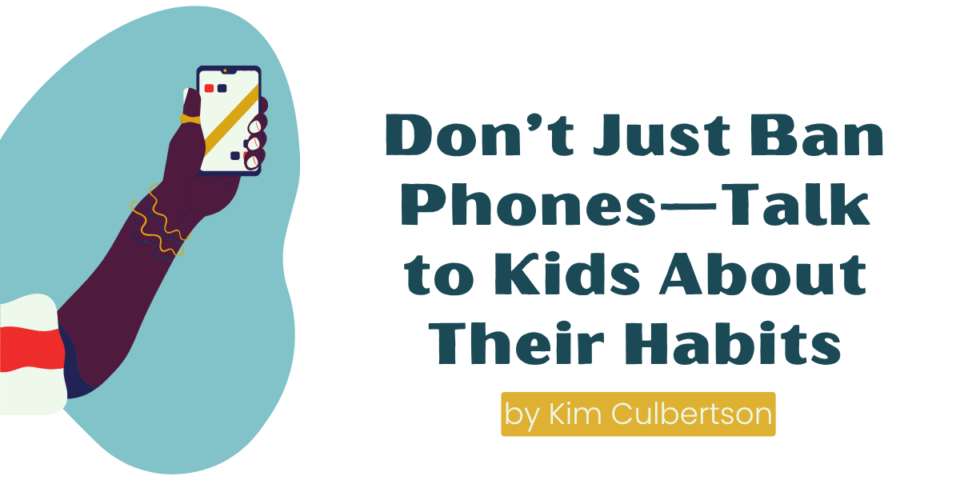
by Kim Culbertson.
I’m not a fan of bans. Not books, obviously. But also (unpopular opinion) not phones. First, when we start banning things, we make things illicit. As educators, I think this can work in our favor with books, but it can also work against us with phones. We all know what forbidding things with teenagers can do – we’ve read Romeo and Juliet.
Full disclosure: I think phones are terrible for our kids. I’ve been teaching high school since 1997 and I’ve seen the impact they’ve had. The data is clear. But I don’t think banning them from classrooms is the answer. I hear people say things in disgust, all versions of, “these teens and their phones!” and I want to remind them that we did this to them. The adults in their lives. We gave them this technology. We can’t get angry with them. The phones didn’t fall out of the sky.
Bréne Brown talks about how this generation is one that wants to know the “why.” They aren’t going to settle for “because I said so.” With this in mind, I have tried to create a culture of asking why in my classroom, about a lot of things, but also about phone use. I want to have intentional conversations with my students about what these devices mean to them, and what their digital habits show them. I don’t want to just tell them to put the phone in their bag, or a box, or their shoe. I want them to understand why they are reaching for it in the first place. Why do they spend so much time scrolling, why do they feel uncomfortable when it’s away from them, why does it hold so much power over them?
The other day I sat with a student during lunch, and we talked about how much time he spends scrolling. “I hate it,” he said. “It’s just…there. I don’t know why I do it.” This is such an important question he’s asking. This is about habits; it’s about understanding our own instincts and needs. I told him I admired that he had identified that for himself. The next time I saw him pull out the phone in class, I asked gently, “is there something essential you need from your phone right now or is this that thing we were talking about?” He grinned and put it away. That same day, another student told me while he was working on his college applications, “all my passwords are on my phone. I need it out.” So, I let him keep it out. He gave me the why. When he was done, he put it away.
Honestly, sometimes, the kids just need a brain break. School is intensive. The world is on fire. So, occasionally, when they seem especially beleaguered, I will say, “five minutes of free phone time and then we’re putting them away, okay?” Funny how when I give them permission, half of them just choose to chat with their neighbor. But after, we talk about establishing boundaries with our technology. I have them share things they do to put limits on themselves. I know some of my colleagues will say they don’t have the “instructional minutes” to take the time to do this, but I argue it’s one of the most important conversations we can be having with them. If part of our job as high school educators is to train them for the world we live in, shouldn’t we also be training them to explore this complicated relationship we all have with those annoying little rectangles? Because it’s not just the teens, is it? I’ve watched many of my colleagues pull out their phones during a staff meeting when we were supposed to be listening, engaging (all the things we ask of our students). Should we ban phones from staff meetings? Or should we all be having these intentional conversations as a culture and maybe cut the teens some slack?
Some Conversation-Starters for Students Around Phone Use
In addition to asking the whole room to both free write and discuss their relationships with their phones as a whole class, here are some intentional questions I ask them individually as I walk around the room and see a dreaded phone emerge:
- Can you talk me through why you need your phone out right now?
- That looks like scrolling...are you using that for class? How?
- I've seen you using your phone a lot lately—do you feel like you're using your time in here effectively?
- How are you using that as a tool for what we're working on?
- Are you finding your phone too distracting today? We all struggle with will power sometimes—do you need to leave it with me?

Kim Culbertson is the author of 100-Word Stories. She holds an M.S. in Education, an MFA in Fiction, and has been teaching high school creative writing and English since 1997. She is the award-winning author of five YA novels. Her titles Catch a Falling Star; The Possibility of Now; and The Wonder of Us were Scholastic book club selections. She won the Northern California Book Award for YA fiction for Instructions for a Broken Heart as well as had The Possibility of Now named a Bank Street Best Book of the Year. In addition to teaching high school, Kim sits on the Writers Council for National Writing Project and works as a Fiction mentor with Dominican University of California’s MFA in Creative Writing. Visit www.kimculbertson.com.


